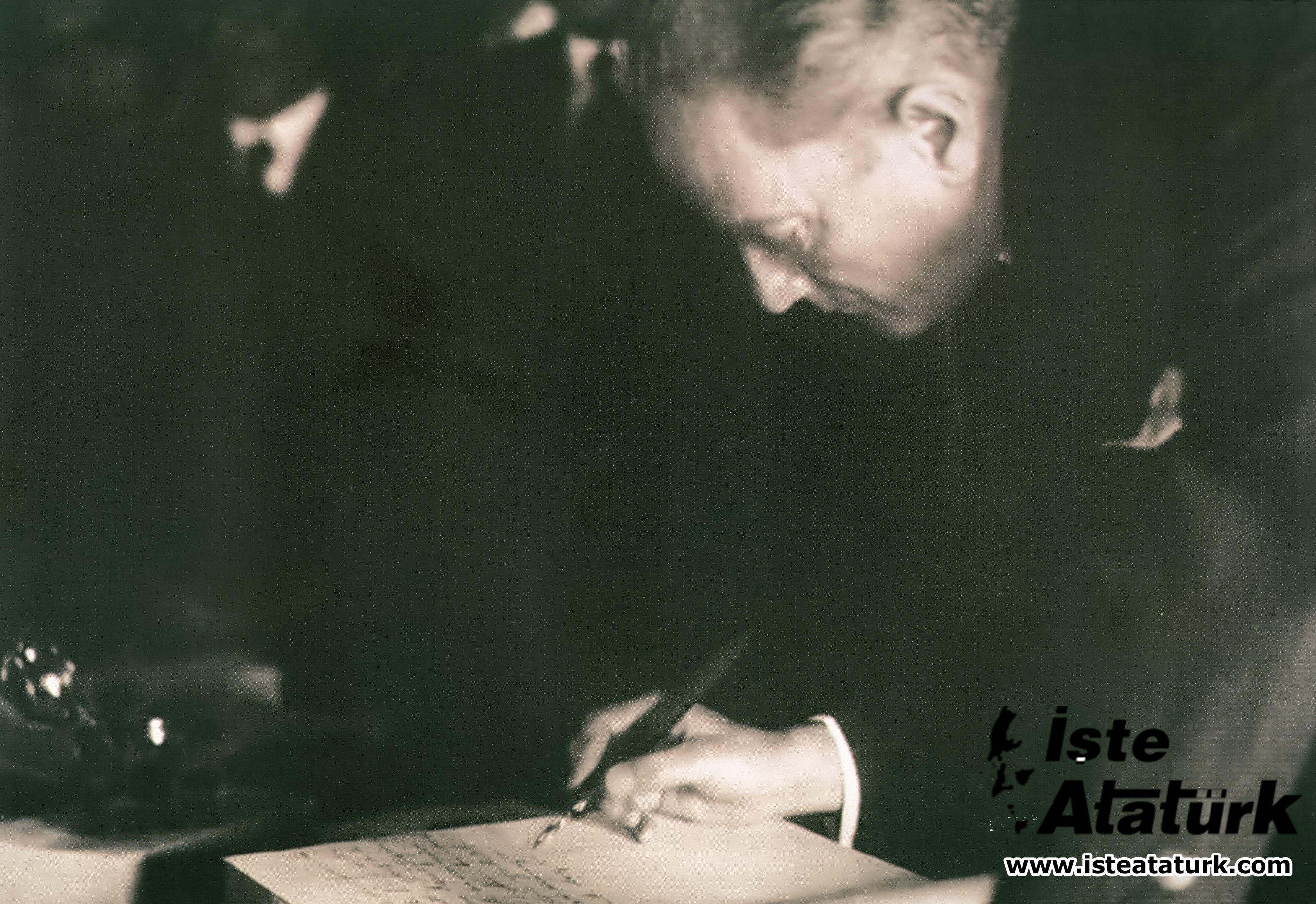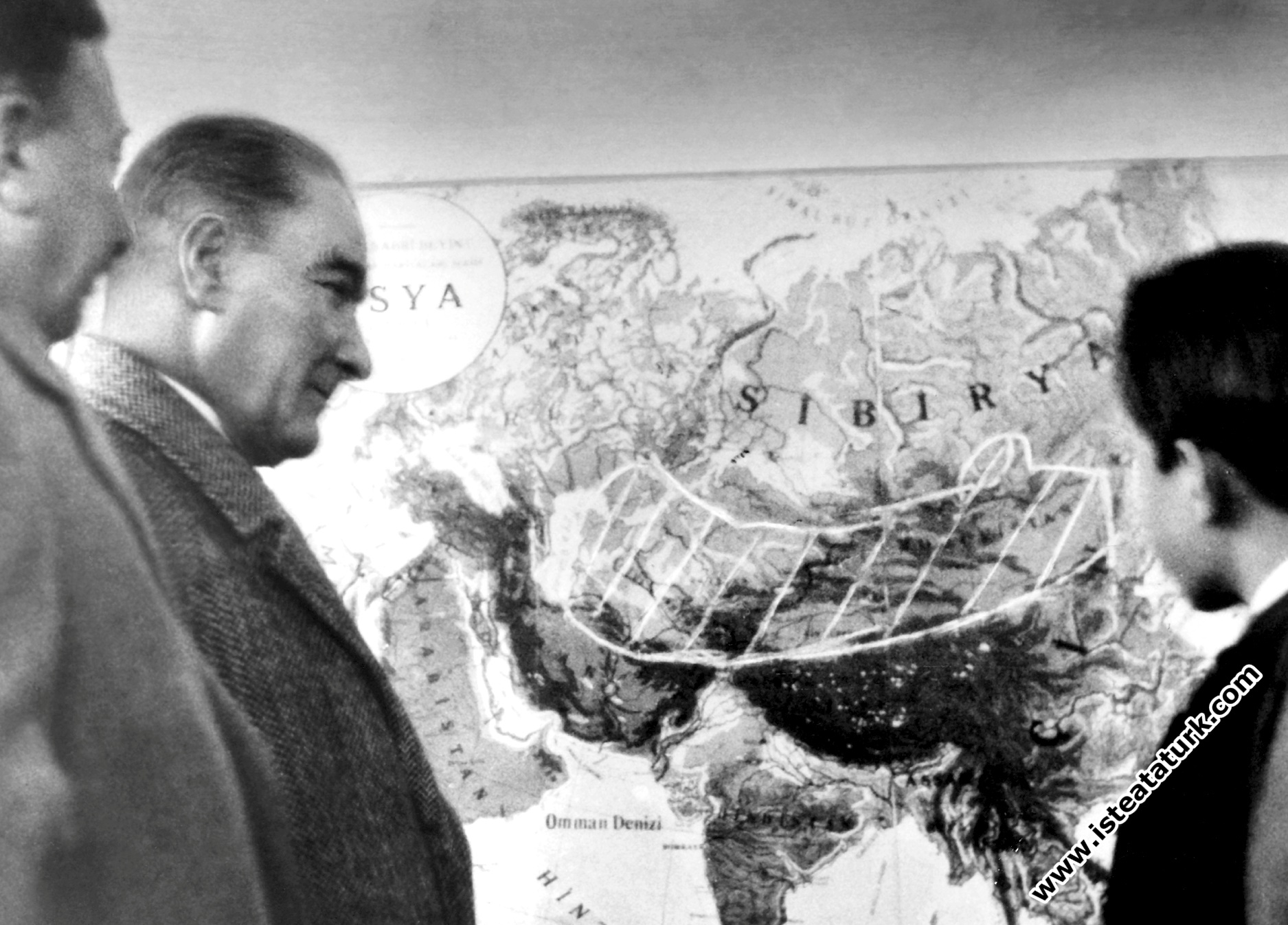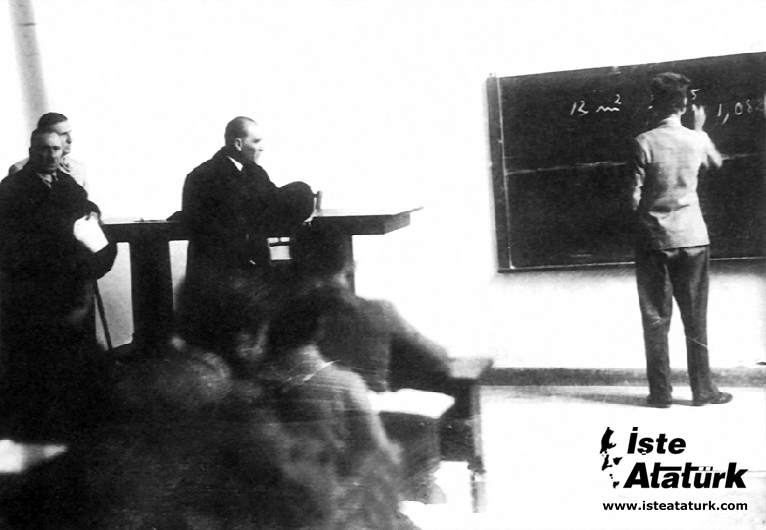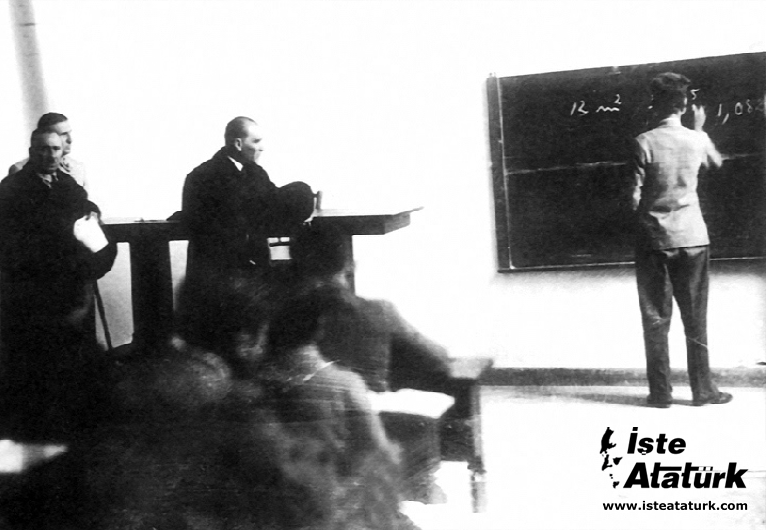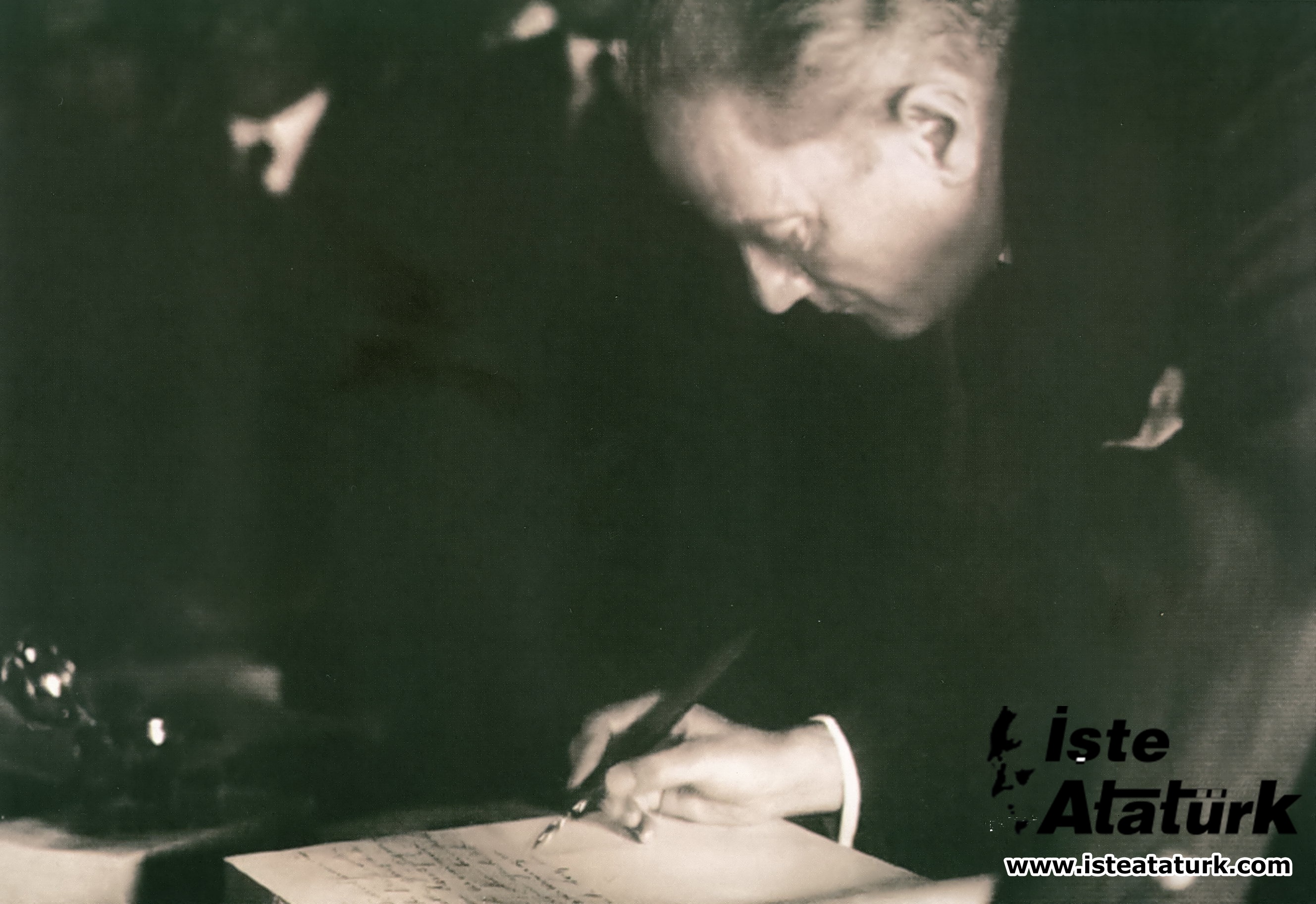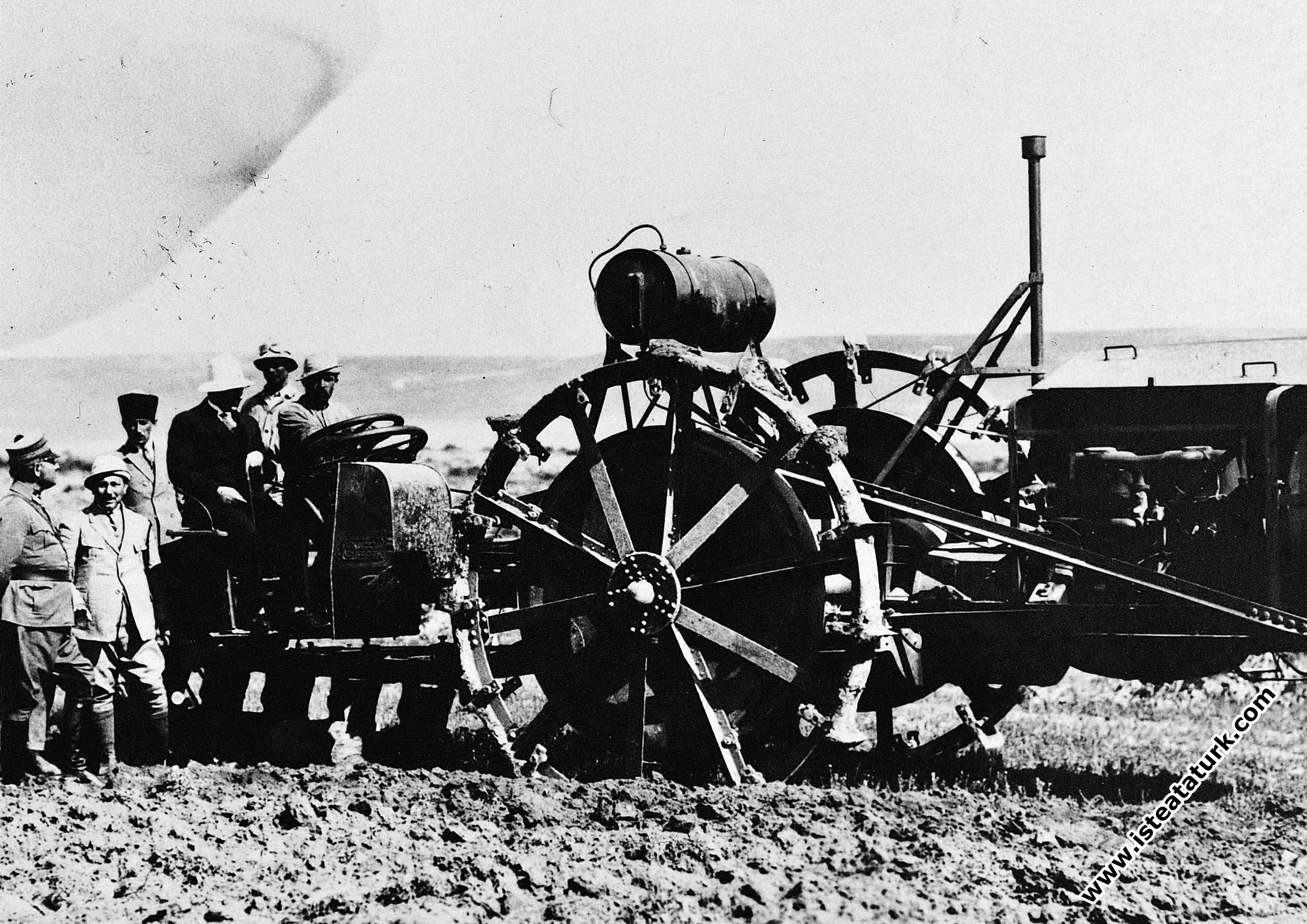
Agricultural Policy in Atatürk Era
Character Size
“True conquest is made with the plow, not just with the sword.” Mustafa Kemal Atatürk
AGRICULTURAL POLICY IN THE PERIOD OF ATATURK
Imagine a country where 80% of the population can't read or write, 90% of them are farmers, 13.000.000 people live on 780.000 km2 land, and imagine that the people of this country are tired from the Balkan, Çanakkale, World War I and finally the War of Independence. exhausted society. The people of this country suffer from many needs in such a situation... The development of the country, overcoming many obstacles, and being fed by producing enough is not expected by the developed countries. However, there are great people in this society who know that the Turkish Nation has a love of progress at its core and have determined certain principles for the development of Turkish agriculture. These people, even if they are a handful of intellectuals, are people who know their way of integrating with their nation; These intellectuals are people who have vowed to extinguish the flames in the borders and in the country. Among these intellectuals, there is someone who has accumulated goals based on contemporary rules in his mind for the Turkish people to have a better life since their youth. He is a great commander, statesman, great Atatürk, who has not taken place in the history of other nations in the last centuries. Yes, the great Atatürk and his friends determined some national principles in their work as patriotic people in front of this hopeless and tired mass of people. It is known that Atatürk's Principles are an open world view. The power source of his reforms is based on science and realism. This worldview has chosen westernization as its goal. Within the framework of these purposes, democratic and secular-based policies were determined. Agricultural Policy has also been put into practice in a dynamism that draws strength from reason and science. He is a great commander, statesman, great Atatürk, who has not taken place in the history of other nations in the last centuries. Yes, the great Atatürk and his friends determined some national principles in their work as patriotic people in front of this hopeless and tired mass of people. It is known that Atatürk's Principles are an open world view. The power source of his reforms is based on science and realism. This worldview has chosen westernization as its goal. Within the framework of these purposes, democratic and secular-based policies were determined. Agricultural Policy has also been put into practice in a dynamism that draws strength from reason and science. He is a great commander, statesman, great Atatürk, who has not taken place in the history of other nations in the last centuries. Yes, the great Atatürk and his friends determined some national principles in their work as patriotic people in front of this hopeless and tired mass of people. It is known that Atatürk's Principles are an open world view. The power source of his reforms is based on science and realism. This worldview has chosen westernization as its goal. Within the framework of these purposes, democratic and secular-based policies were determined. Agricultural Policy has also been put into practice in a dynamism that draws strength from reason and science. Yes, the great Atatürk and his friends determined some national principles in their work as patriotic people in front of this hopeless and tired mass of people. It is known that Atatürk's Principles are an open world view. The power source of his reforms is based on science and realism. This worldview has chosen westernization as its goal. Within the framework of these purposes, democratic and secular-based policies were determined. Agricultural Policy has also been put into practice in a dynamism that draws strength from reason and science. Yes, the great Atatürk and his friends determined some national principles in their work as patriotic people in front of this hopeless and tired mass of people. It is known that Atatürk's Principles are an open world view. The power source of his reforms is based on science and realism. This worldview has chosen westernization as its goal. Within the framework of these purposes, democratic and secular-based policies were determined. Agricultural Policy has also been put into practice in a dynamism that draws strength from reason and science.
The Agricultural Policy in Atatürk's period did not promise the Turkish society a paradise on earth, as in other practices, nor did it choose as an example the ideologies that put the mind and conscience of the Turkish peasants and people in chains, as in the neighboring authoritarian regimes. In other words, the Agricultural policy in Atatürk's period is not a conditioned view like a closed (fanatic religious regimes) rotating around its own axis. This policy is based on a founding, implementing, contemporary Agricultural culture system. At the same time, it is a plan based on the foundations that foresee the development of private enterprise under the leadership of the state, since there is no knowledge and capital accumulation of the private enterprise, which acts according to the level of development.
On the other hand, since the establishment of our Republic, Great Atatürk has made many guiding statements since the establishment of our Republic.
Some of these are those;
“The owner of Turkey is the real and the master and the real producer peasant”
In this words, I am quoting a related memory here. (Summary)
There is no doubt that this seemingly simple event led to more fundamental steps in our agricultural policy.
The year is 1936 Atatürk is in the Florya mansion in Istanbul. Autumn of the Seasons. Atatürk is bored because he cannot contact the people in the mansion. He proposes to his friend Nuri Conker from Thessaloniki days to sneak away from the mansion. Nuri Conker finds a special car and changes his clothes at Atatürk, and they start to move towards Çekmece with the private car waiting at the door of the mansion. Ataturk is cheerful. There is no one in the escort. Suddenly, Atatürk's eyes are fixed on a villager who is driving doubles. He stops the car. He goes to the villager, the couple has an ox on one side and a donkey on the other. The great leader begins to talk to the peasant. The villager did not recognize him. Atatürk asked the couple why they ran a donkey instead of an ox. The villager reported that tax officers sold it. Atatürk asks the headman and district governor why he did not complain, and states that the ox should not be sold. The villager says, "Will they not know, even a bird does not fly here, now we have Atatürk on our head". Atatürk tells the Governor and Chief Deputy İsmet Pasha to tell his troubles. The villager informs them that he will not be able to hear his troubles. Finally, recommending Mustafa Kemal Pasha to tell his troubles, the villager said to Atatürk, "Is he going to raise his head from his job and watch after our ox?
Atatürk returns to the mansion with Nuri and orders his aide to call the Deputy Minister in Istanbul and the Chief Deputy İsmet Pasha, the Governor of Istanbul. He tells Nuri to bring the villager Halil Agha to the mansion. Nuri Bey brings Halil Ağa to the mansion upon the insistence of his wife, promising that the person who meets with him from many occupations will give him an ox.
There are 25 people at the table. Atatürk once said to those present, “Our master will come to our table this evening”. Everyone was surprised, who is this lord? Atatürk gives instructions to the Chief Aide. Villager Halil insists on not entering the network. He believes that he is punished for his babbling. Nuri Bey takes the arm of the villager and takes him into the hall.
After saying welcome to Halil Agha, Atatürk introduces him as "Here is the master we've been waiting for". Atatürk had a villager repeat what was said in the field and what Halil Ağa said about everyone, in the presence of those present. Halil agha leaves after the treat. Addressing those present, Atatürk said, “Either we made the law of Halil Ağa, which hinders production by selling his ox, or the law we made is being misinterpreted and implemented. If we have made such a law, it is against the interests of the country. How do we do it, if the law we make is interpreted like this, what kind of administration is the government?
"Speaking in the form of" We did not establish the Republic as a decoration. We did it to establish an administration on the side of the people. The government has inspectors, governors, district governors. They must know what it means to sell Halil Ağa's ox. We have a party organization, they have to live arm in arm with the people, they do not talk about such a practice, what does this mean? It is thought that we have established a system with the people and not for the people, but in spite of the people. This is where I am most upset. We couldn't explain the Republic, guys, that's what comes out of it."
Atatürk gave the necessary instructions to those who were present, especially the Prime Minister İsmet Pasha, mentioning that the survival of the revolutions depends on the raising of a conscious and revolutionary generation, and that there is a danger if what happened to the Halil aghas does not reach the Government and the Grand National Assembly.
Other important phrases are:
- “The foundation of the national economy is agriculture.” 1.11.1923
- “True conquest is made with the plow, not just with the sword.” 16.3.1923
- “Sword and plow, the first of these two conquerors was always defeated by the second, and the others…” 16.3.11923
Thus, in the policy put forward, a package project work was started that includes technical and administrative fields. So many useful steps have been taken in this regard that to include all of them falls within the subject of “Writing the History of Agriculture in Atatürk's period. We will try to include the main cornerstones in politics in our speech.
For example, the law numbered 682 enacted on December 2, 1925, is the law on the distribution of all kinds of saplings and seeds free of charge for the development of agriculture and the establishment of a nursery under the management of the state, the education of the farmer and the giving of seeds free of charge in order to increase the yield. This law is a demonstration of farmer training methods. It is a basic, technical application to make. When Marshall aid began (in the 1950s), I witnessed United States Agricultural Experts bewildered by the existence of such a law in Turkey long ago. Because, in the USA, demonstrations to teach an innovation in agriculture to farmers (the state gives the material, it is a method of teaching the planting of a new seedling by having the farmer apply a new technique under the supervision of experts.
Of course, at that time, the management of the villages, solving the problems of development, cooperation, the development of the village with the union of forces were also taken into consideration and the village law numbered 442 was enacted. In addition, in order to increase the yield, a law has been enacted to exempt high yielding seeds from customs duty in accordance with ecological conditions. On the other hand, along with this efficiency-enhancing measure, Seed Improvement Stations were established as Great Atatürk stated in his parliamentary opening speech. These stations still operate as Agricultural Research Institutes. A lot of research has been done in this field and great contributions have been made to Turkish Agriculture.
In addition to the establishment of agricultural organizations, capital is provided to these organizations with the Fixed and Revolving Fund laws. This law, which was enacted on January 26, 1925, is a separate basic arrangement for showing the technical work results to the farmers with the help of the state, and teaching the concepts of capital investment and profitability.
In the Atatürk period, the mechanization of agriculture was also envisaged. It was given importance to use modern agricultural tools and machinery in the Forest Farm that Atatürk established.
Thus, while breakthroughs are made in the field of agriculture, of course, there is a need to organize agriculture as in contemporary countries. Law No. 1910 on the Organization of the Ministry of Agriculture was enacted on December 29, 1931 in this area. Later, additional laws came into force. Again with regard to institutionalization, the Veterinary Organization and the Forestry Organization were brought into a modern order in this period. The Forestry Organization was established with the veterinarian in the Law on Duty and Organization of the Ministry of Agriculture, which was enacted on June 4, 1935, and with the Forest Law No. 3116 adopted in 1937 and its additions. The Animal Health and Police Law enacted on May 3, 1928 in the field of veterinary medicine is still in force.
At that time, giving revolving funds to enterprises as a requirement of Çağdaş Tarım (1934). Establishment of Agricultural Sales and Credit Cooperatives (1935). Cotton works, paddy cultivation, the establishment of the TC Ziraat Bankası, the establishment of the General Directorate of State Meteorology Affairs were in 1937. In addition, the Higher Institute of Agriculture was established in 1933, and then Ankara University Faculty of Agriculture and Veterinary Medicine was born from this Institute. Again, as an important breakthrough in this period, the planting of sugar beet and the establishment of Sugar Factories are the cornerstones of the Agricultural Policy of the Republic of Turkey. Factories and farms for sugar beet agriculture were established according to their examples in Hungary. On the other hand, this period was also abolished in Aşar. While all these studies were carried out, German and Hungarian Agricultural Experts were especially benefited. For example, my teacher of the Meteorology Organization, Prof. Dr. Founded by Retly Antal. In the field of meadow, pasture and forage crops, Prof. Dr. Kolbai Karoly, Prof. in Animal Husbandry. Dr. Welmann Oszkar and Prof. in Agricultural Geology. Dr. Locy Lajos, German Prof. Dr Oristiansen and others have helped the development of Turkish Agriculture under the leadership of the great Atatürk.
During this period, students were sent to Germany and Hungary to study in different branches of Agriculture. I was among these students. After passing the exam in 1936, I was sent to Budapest and graduated from the Department of Agricultural Engineering at the Technical University as the first foreign and Turkish student and returned to my homeland. Many Turkish Agricultural Engineers and veterinarians who were educated in Germany and returned to their homeland will also be studying at A.Ü. They became faculty members of the Faculty of Agriculture and Veterinary Medicine.
It is seen that, in addition to the domestic affairs, foreign affairs, economy, education and training and other social policies carried out under the leadership of Atatürk at that time, the Agricultural Policy is one of the cornerstones of the modernization of the Turkish people, who formed the young Republic of Turkey. This formation constituted an invariable basis for the establishment of dynamic and modern agricultural culture throughout the country. If the relevant people write our Agricultural History, this formation will emerge more clearly. If the changes in the subject of agriculture are taken seriously among the revolutions made in this period, we can say that it is time to establish an "Agricultural Museum" as in foreign countries. Using agricultural tools and machinery (Atatürk's tractor and agricultural tools) with seeds, ox carts, peasants' sandals, land slings, horse saddles, sickles, It is now the duty of our generations to reveal where agriculture has come from in Anatolia since the Hittites, with many more material historical values. A.U. Dear Rector Prof. Dr. Günel AKBAY told me that he started work to establish an Agricultural Museum, but it is our greatest desire that the work goes a long way in a more visible way. It should not be forgotten that the great Atatürk gave special importance to technical fields such as agriculture, in addition to historical subjects. If Atatürk were alive, he would certainly support a museum initiative. If we are walking in his path, let us try to fulfill the requirements of our steps. Günel AKBAY told me that he started work to establish an Agricultural Museum, but it is our greatest desire that the work goes a long way in a more visible way. It should not be forgotten that the great Atatürk gave special importance to technical fields such as agriculture, in addition to historical subjects. If Atatürk were alive, he would certainly support a museum initiative. If we are walking in his path, let us try to fulfill the requirements of our steps. Günel AKBAY told me that he started work to establish an Agricultural Museum, but it is our greatest desire that the work goes a long way in a more visible way. It should not be forgotten that the great Atatürk gave special importance to technical fields such as agriculture, in addition to historical subjects. If Atatürk were alive, he would certainly support a museum initiative. If we are walking in his path, let us try to fulfill the requirements of our steps.
It is seen that in a period with limited opportunities, the most advanced modern sanctions were included in order for the young farmers of the Republic of Turkey to become a desired producer society in a short time. All these packages of agricultural development breakthroughs have formed the cornerstones of Turkish Agricultural Policy. We can easily say that the Culture of Agricultural Policy has been embedded in the life of the Republic of Turkey. I would like to point out how true this strong policy was when I was working for the United Nations Food and Agriculture Organization (FAO) years later and as a person who later participated in the World Bank's Agricultural Credits activities, that Atatürk's agricultural policy was not intended to contribute to the agricultural development of a developing country. The above-mentioned issues are also included in the reports and projects prepared by these international organizations for
1- Training of farmers, use of new methods and materials,
2- Mechanization in agriculture,
3- Institutionalization and establishment of revolving fund enterprises,
4- Finding credit resources and lending,
5- Forward-looking breakthroughs in evaluation It is an agricultural policy that implements a very forward-looking strategy that knows all the obstacles in front of it in the field of agriculture in the Atatürk period and reveals the ways to overcome these obstacles. Just like the strategies used to recognize and defeat the enemies who have invaded our homeland. If we consider the issues from this point of view, then we will act according to Atatürk's principles and we will be very successful.
We commemorate the Great Atatürk and his devoted friends once again with mercy.
UTILIZED RESOURCES
1- Atatürk, Speech (Speech) Turkish Language Institution Published, 220, A.Ü. Publishing house 1963.
2- Bozdag I, Ataturk's Table, Caravan Published, Kervan Printing Industry and TAŞ., Istanbul 1975.
3- Felek B. “Independence Courts and Judicial Events in the First Years in Turkey”, Milliyet Newspaper Aktüalite (supplement), copy dated February 1981.
4- Cretan I. “Kemalism is a National Modernization Ideology”, Milliyet Newspaper dated 25 February 1981.
5- Kuneralp Z., “Only Diplomat”. March 5, 1981 Milliyet Newspaper.
6- Ülkümen S., “Atatürk Contemporary Civilization and Tolerance”, Milliyet Newspaper, 17 February 1981.
7- Ministry of Agriculture, Publication and Promotion Directorate, Agricultural Laws, Güneş Matbaacılık TAŞ. Ankara 1967.
8- Turkish Republic General Staff Military History and Strategy Studies, Atatürk Publications Service No. 10, Atatürk in his own words, General Staff Printing House, Ankara 1981.
9- Personal Memories.
Prof. Dr. Vecdet Erkun
Source: ATATÜRK ARAŞTIRMA MERKEZİ DERGİSİ, Sayı 42, Cilt: XIV, Kasım 1998, Türkiye Cumhuriyeti'nin 75. Yılı Özel Sayısı
